unit 5 状语从句讲解
人教版八年级下册英语Unit 5 知识点语法归纳总结
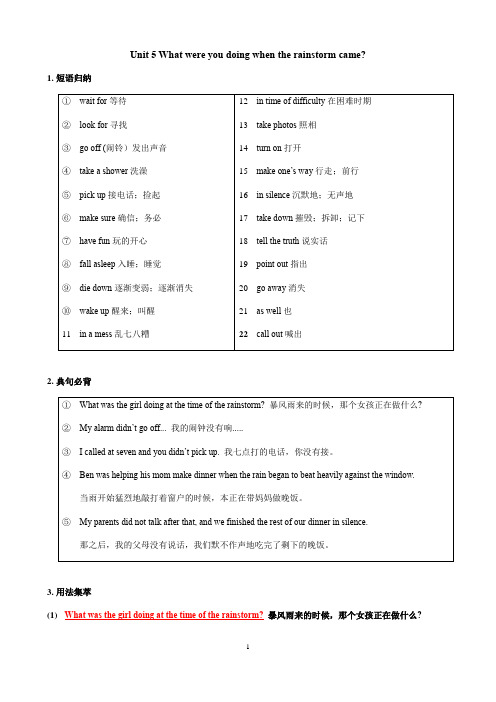
Unit 5 What were you doing when the rainstorm came?1.短语归纳2.典句必背3.用法集萃(1)What was the girl doing at the time of the rainstorm?暴风雨来的时候,那个女孩正在做什么?❖本句是特殊疑问句,时态是过去进行时,结构是“What+was/were+主语+doing+其他?”,用于询问某人在过去的某个时间正在做的事情。
例:—What were you doing at nine o’clock yesterday evening? 昨天晚上九点你正在做什么?—I was watching TV at home. 我正在家里看电视。
❖拓展:过去进行时描述过去某个时刻正在发生的动作或存在的状态,结构是“was/ were+动词的现在分词”。
例:When I got home my mother was cooking. 我到家的时候我妈妈正在做饭(2)My alarm didn’t go off... 我的闹钟没有响.....❖go off意为“(闹钟)发出响声”例:My alarm goes off at six every morning. 我的闹钟每天早晨6点响。
❖归纳:go off还有“离开”和“变质”之意。
例:Bob went off to get a drink. 鲍勃拿饮料去了。
Meat goes off quickly in hot weather. 热天肉变质得快。
❖拓展:go的短语(3)I called at seven and you didn’t pick up. 我七点打的电话,你没有接。
❖pick up意为“接电话”。
pick up有如下含义:(4)I called again at eight and you didn’t answer then either. 我八点再打来,你也没接。
人教版英语八年级下册Unit5易混点拨:when,while和as引导时间状语从句的用法

易混点拨:when, while和as引导时间状语从句的用法一、when的用法如果只从现象来看,when从句用的最多的是一般过去时,而主句的时态没有限制,根据具体情况而定。
When he was a child he was always trying out new ideas. 他小时候就常常试验一些新的设想。
when she came into my room I was just reading a book. 她走进我房间时,我正在看书。
Were you writing when the teacher came in? 老师进来的时候,你在写信吗?Sorry. I was out when you called me. 对不起,你打电话来的时候我出去了。
He was on the point of leaving when someone knocked at the door.他正要走,这时有人敲门。
I thought of it just when you opened your mouth.就在你要说话的时候,我也想到了。
I had hardly[scarcely] closed my eyes when someone knocked at the door. 我刚一闭上眼,就有人在敲门了。
根据以上的例句,我们可以总结出一点:when从句的A事件,相当于另一个事件B发生的时间点。
也就是说,when从句的重点不在动作本身发生的状态,而只是把它作为一个时间点,所以when多数情况下用的是一般过去时,则不用正在进行时。
因为如果用正在进行时,它表示的就是一段时间而不是一个时间点了。
根据这一点,有的文章补充说:when从句的动词大多是瞬时动词。
这种说法也可以参照。
实际上,when从句也可以有其它的时态,但几乎也不用进行时,因为它也只是作为一个时间参照点。
例如:When I got to the airport, the guests had left. 当我赶到飞机场时,客人们已经离开了。
八年级英语unit 5 if you go to the party, you’ll have a great time考点重点难点详解人教版

八年级英语下周末辅导资料(5)Unit 5 If you go to the party, you’ll have a great time一. 重点单词1. organize 组织2. against prep.反对3. chance n.机会;机遇4. tonight n.今晚,今夜5. window n.窗;窗户6. explain v.解释;说明7. improve v.提高;改进二. 重点词组1.If you go to the party ,you will have a good time .(if引导的条件状语从句,时态是“主将从现”)2.go to the party 去参加聚会3.have a great/good time =have fun = enjoy oneself 玩得高兴,过得愉快4.let sb in 让某人进入5.take away 拿走6.all the time = always 总是,一直7.make a living 谋生8.in order to …为了…9.study for …test 为…考试而学习10.stay at home 呆在家里11.Let’s have/make it …让我们约定在…12.half the class 一半的学生13.end-of-year party 年终晚会14.go to college 上大学15.travel around the world 环游世界16.make a lot of money 赚很多钱17.get an education 受教育18.in fact 事实上19.a professional soccer player 一名职业足球运动员20.play sports for a living 以运动为谋生21.get injured 受伤22.be famous for…因…而出名23.too much+不可数名词/too many+可数名词复数太多的…24.much too +形/副词实在太…25.so much +不可数名词/so many +可数名词复数如此多…三. 重点句子1. I think I’ll ride my bike. If you do, you’ll be late.2. I think I’m going to stay at home. If you do, you’ll be sorry.四. 重点语法: 由if引导的条件状语从句if用做连词时,可以表示“如果;假如”,用来引导一个条件状语从句。
UNIT5if引导的状语从句语法讲解
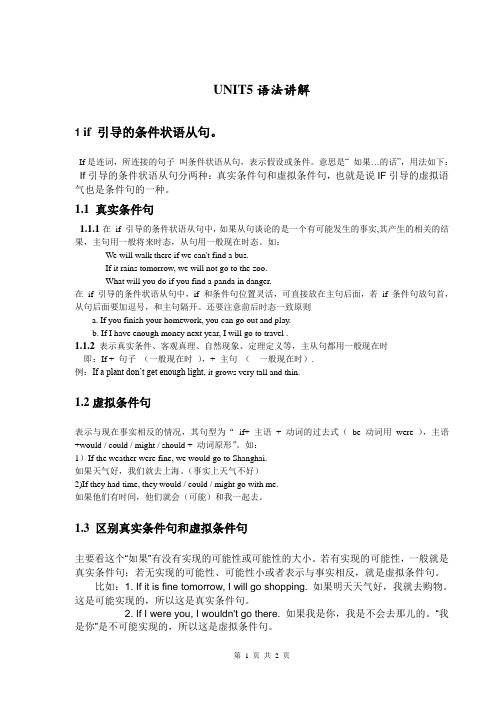
UNIT5语法讲解1 if 引导的条件状语从句。
If是连词,所连接的句子叫条件状语从句,表示假设或条件。
意思是“ 如果…的话”,用法如下:If引导的条件状语从句分两种:真实条件句和虚拟条件句,也就是说IF引导的虚拟语气也是条件句的一种。
1.1 真实条件句1.1.1在if 引导的条件状语从句中,如果从句谈论的是一个有可能发生的事实,其产生的相关的结果,主句用一般将来时态,从句用一般现在时态。
如:We will walk there if we can't find a bus.If it rains tomorrow, we will not go to the zoo.What will you do if you find a panda in danger.在if 引导的条件状语从句中,if 和条件句位置灵活,可直接放在主句后面,若if 条件句放句首,从句后面要加逗号,和主句隔开。
还要注意前后时态一致原则a. If you finish your homework, you can go out and play.b. If I have enough money next year, I will go to travel .1.1.2表示真实条件、客观真理、自然现象、定理定义等,主从句都用一般现在时即:If + 句子(一般现在时),+ 主句(一般现在时).例:If a plant don’t get enough light, it grows very tall and thin.1.2虚拟条件句表示与现在事实相反的情况,其句型为“if+ 主语+ 动词的过去式(be 动词用were ),主语+would / could / might / should + 动词原形”。
如:1)If the weather were fine, we would go to Shanghai.如果天气好,我们就去上海。
Unit5 条件状语从句
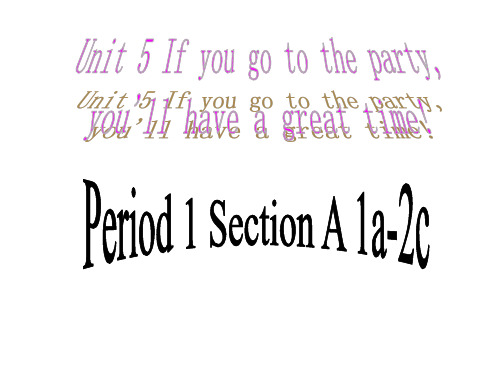
Let’s have a try!
shout 1.If you _____ (shout) at the party ,you will have(have) to leave. ______ will be 2.If I go to college, I______ (be) a college student.
• 5.If she ______ (be) kind to me, I ______ (not argue) with her. • 6.They _______(not go) there by air if it _____ (be) cloudy. • 7.If it _________ (not rain) tomorrow, we _______ (go) to the zoo. • 8.Her mother ______ (be) angry with her if she ______ (watch) TV too much.
5.She won’t go (not go) to school if she doesn’t feel ________ __________ (not feel) well.
Grammar
If you do, you’ll be tired. If you do, you’ll be sorry. If you do, you’ll be happy.
If you do, you’ll be healthy.
在包含if 引导的条件状语从句的句子中,当主句 是一般将来时时,条件状语从句要用一般 现在时.即主将从现
构成 时态
条件状语从句
If+一般现在时主句主语+will + 动词原形 he will take us to the zoo.
选修6unit5语法解析
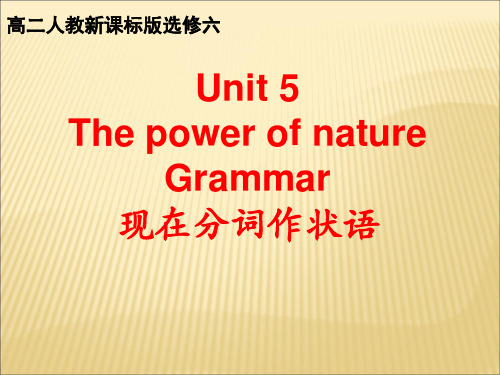
old friend of hers. 3. When autumn comes, swallows go to the south.
A__u_t_u_m__n_ __c_o_m__in__g, swallows go to the south.
尽管尝试了多次,但他仍未成功。
Working very hard, he didn’t feel a bit tired.
尽管拼命地工作,他却丝毫不感到疲劳。
6.作条件状语,表示一种假设情况,相当于一个 条件状语从句。
Using your head, you will find a way.
(=If you use your head, you will find a way.) 7.作评论性状语(悬垂结构) 作为句子的独立成分来修饰全句,表明说话者的
4.作结果状语 表示必然的结果,通常放在主句后面中间用
逗号隔开,有时为了突出结果,分词前加thus。
Her husband died, leaving her four children. 5.作让步状语,相当于一个让步状语从句
Having tried many times, he still couldn’t succeed.
三、使用- ing形式作状语需注意的几个问题 1. 分词 (短语) 作状语时, 其逻辑主语必须与句子 的主语一致。如果不一致, 必须用独立主格结构来 表示, 也就是在分词前面加上它的逻辑主语。
Finding her car stolen, she hurried to a policeman for help.
译林版英语七年级上册unit5知识点
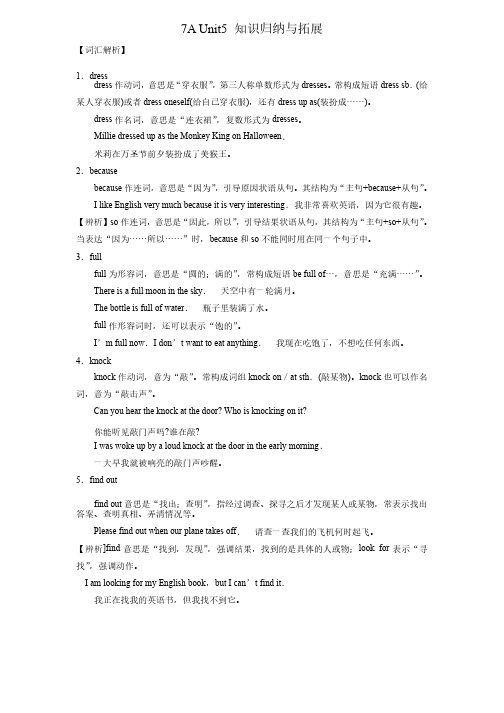
7A Unit5 知识归纳与拓展【词汇解析】【词汇解析】1.dress dress 作动词,意思是“穿衣服”,第三人称单数形式为dresses 。
常构成短语dress sb .(给某人穿衣服)或者dress oneself(给自己穿衣服),还有dress up as(装扮成……)。
dress 作名词,意思是“连衣裙”,复数形式为dresses 。
Millie dressed up as the Monkey King on Halloween . 米莉在万圣节前夕装扮成了美猴王。
米莉在万圣节前夕装扮成了美猴王。
2.becausebecause 作连词,作连词,意思是意思是意思是“因为”“因为”,引导原因状语从句。
引导原因状语从句。
其结构为其结构为其结构为“主句“主句+because+从句”。
I like English very much because it is very interesting .我非常喜欢英语,因为它很有趣。
.我非常喜欢英语,因为它很有趣。
【辨析】so 作连词,意思是“因此,所以”,引导结果状语从句,其结构为“主句+so+从句”。
当表达“因为……所以……”时,because 和so 不能同时用在同一个句子中。
不能同时用在同一个句子中。
3.fullfull 为形容词,意思是“圆的;满的”,常构成短语be full of …,意思是“充满……”。
There is a full moon in the sky . 天空中有一轮满月。
天空中有一轮满月。
The bottle is full of water . 瓶子里装满了水。
瓶子里装满了水。
full 作形容词时,还可以表示“饱的”。
I ’m full now .I don ’t want to eat anything . 我现在吃饱了,不想吃任何东西。
我现在吃饱了,不想吃任何东西。
4.knockknock 作动词,意为“敲”。
八年级英语新目标下 Unit 5 “if条件状语从句”复习课件

从句:一般现在时 主句:含情态动词 can/could/must/should等
Summary
[句式结构]:If从句,+ 主句. / 主句 + 从句 [时态]: 一般现在时, 一般将来时(will) 情态动词(can/must/should/…) 祈使句
例句:如果明天不下雨,我们将去露营。 If it doesn’t rain tomorrow, we’ll go camping. 如果你想取得好成绩,你必须更努力学习。 If you want to get good grades, you must study harder. 如果发生火灾,请打110。 If a fire happens, please call 110. [考点注意]:if的两个不同用法: “是否”;“如 果” will come Can you tell me if he _________ (come) tomorrow? comes If he ________(come) tomorrow, give the message to him.
4. Where will he ______(see) the film if he ____ see _________(have) time? has 5. If there _______(be) fewer trees, there are __________( be) more pollution. will be happens 6. If an earthquake __________ (happen) in Shantou, can you imagine what ___________ will happen (happen)? 7. If you _______ (have) a car accident, you should have call your parents or your friends. 8. If you stay _____(stay) at home alone, what _____ will you _____ (do)? do
人教版九年级全一册英语Unit5单元语法知识点总结

人教版九年级全一册英语Unit5单元语法知识点总结本单元重点短语的具体用法1. be made of:表示某物由某种材料制成,且制成后原材料仍可辨认。
例如:- This table is made of wood. 这张桌子是由木头制成的。
2. be made from:与“be made of”意思相近,但强调制成的物品已经看不出原材料。
例如:- Paper is made from wood. 纸是由木头制成的。
3. be known for:意为“因……而闻名”。
例如:- This city is known for its beautiful beaches. 这座城市以其美丽的海滩而闻名。
4. be used for:表示某物被用于某种目的。
例如:- This tool is used for cutting wood. 这个工具是用来砍木头的。
5. no matter:“不论;无论”,引导让步状语从句。
例如:- No matter what happens, I will always support you. 无论发生什么,我都会一直支持你。
6. be covered with:表示被某种东西覆盖。
例如:- The ground is covered with snow. 地面被雪覆盖了。
7. as far as I know:“据我所知”,常用在句首。
例如:- As far as I know, she is a very kind person. 据我所知,她是一个非常善良的人。
8. by hand:“用手”,强调手工制作。
例如:- These cookies were made by hand. 这些饼干是手工制作的。
9. be good for:“对……有益”,例如:- Exercising is good for your health. 锻炼对你的健康有好处。
10. on the last Friday of each month:“在每个月的最后一个星期五”,例如:- The meeting is always held on the last Friday of each month. 会议总是在每个月的最后一个星期五举行。
八年级英语unit 5 if you go to the party, you will have a great time. 人教新目标版知识精讲

初二英语Unit 5 If you go to the party, you will have a greattime. 人教新目标版【本讲教育信息】一. 教学内容:Unit 5 If you go to the party, you will have a great time.二. 教学目标:本单元以“参加聚会”为话题,引入因果关系的表述方法,使同学们学会条件状语从句的表达方法,并学会祈使句的用法。
三. 教学重点:if引导的条件状语从句四. 重点词组:make money (挣钱),make a living(谋生),all the time(一直,总是),around the world (世界各地),take away(拿走)五. 语法:if引导的条件状语从句;祈使句;[教学过程]一、语言知识精讲1. I think I’m going to go to the party with Karen and Ann.此句中的be going to +V原,表示将要发生的事或计划、打算要做的事。
(1)Ann准备干什么?What is Ann going to do?(2)我打算在家里呆着。
I’m going to stay at home.2. If you do, the teacher won’t let you in.(=will not)句中的let (…) in 意为“允许进入”。
let 为使役动词,后面跟动词原形。
(1)Please open the window and let in some fresh air.(2)Could you please let me in your party? (允许参加)let in 的反义词是let out,意为“放出……,释放,泄漏”We should let the bird out(of the cage).3. Don’t wear jeans. Please bring your ID card.这两句是祈使句的否定形式和肯定形式。
八年级上册英语unit5
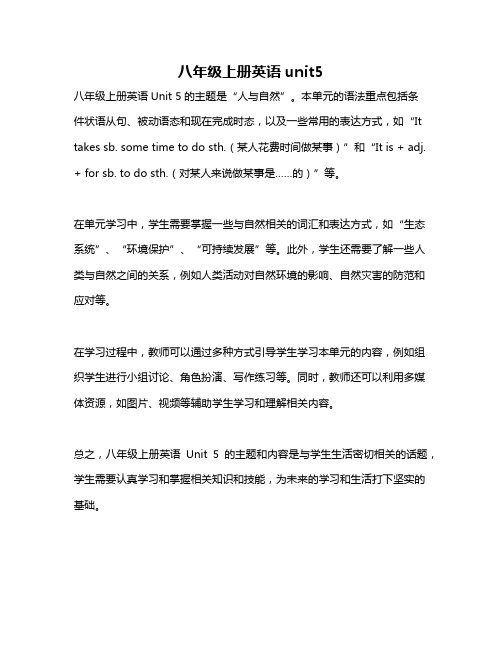
八年级上册英语unit5
八年级上册英语Unit 5的主题是“人与自然”。
本单元的语法重点包括条
件状语从句、被动语态和现在完成时态,以及一些常用的表达方式,如“It takes sb. some time to do sth.(某人花费时间做某事)”和“It is + adj. + for sb. to do sth.(对某人来说做某事是……的)”等。
在单元学习中,学生需要掌握一些与自然相关的词汇和表达方式,如“生态系统”、“环境保护”、“可持续发展”等。
此外,学生还需要了解一些人类与自然之间的关系,例如人类活动对自然环境的影响、自然灾害的防范和应对等。
在学习过程中,教师可以通过多种方式引导学生学习本单元的内容,例如组织学生进行小组讨论、角色扮演、写作练习等。
同时,教师还可以利用多媒体资源,如图片、视频等辅助学生学习和理解相关内容。
总之,八年级上册英语Unit 5的主题和内容是与学生生活密切相关的话题,学生需要认真学习和掌握相关知识和技能,为未来的学习和生活打下坚实的基础。
Unit5条件状语从句考纲词汇牛津上海版英语九年级上册

9A U5 基础训练9A U5重点知识点详解✧Joyce wanted to have a feature about memory. Joyce想做一个有关记忆的特色专栏节目。
✧go wrong变坏这里go是“连系动词”,意为“变为,成为,处于……的状态”。
例如:The young man went mad when he won the lottery. 那个年轻人买彩票中了奖,竟变疯了。
At that time his family was very poor. The children often went hungry.✧afterwards adv. 后来,以后ward(s) 后缀(1)构成形容词表示“向……的”;(2)构成副词表示“向”。
例如:forwards 向前backwards 向后downwards 向下upwards 向上✧injure/hurt/harm/damage/wound/destroy用法区别injure vt. 损害,伤害,毁坏,指在事故中收到的意外伤害或情感、名誉上的伤害。
例如:Don’t injure his pride. 不要伤害他的自尊心。
hurt vt.&vi. 使……受伤痛,损害,危害,指肉体或精神上的伤害、创伤,强调伤害造成的痛苦。
例如:It hurts your eyes to read in bed. 在床上看书对眼睛有害。
harm n.&vt. 伤害,损害,危害,指对人或事物的危害Animals are our friends. We can’t harm them. 动物是人类的朋友,我们不要伤害它们。
damage vt.&n. 损害,毁坏,破坏,指因损害而使之失去使用价值、用途等。
The acid rain damaged the crops. 酸雨毁坏了庄稼。
wound vt. &vi. &n. 使……受伤,指利器或子弹给身体造成的伤害。
Unit-5-What-were-you-doing-when-the-rainstorm-came
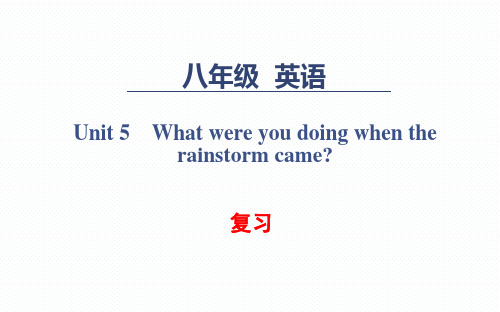
12. realize 动词,意为“理解;领会;认识到”。 汤姆意识到他的书包在家里。
Tom realized his bag was at home. 13.【辨析】for example与such as ①for example一般用于列举同一类人或事物中的一个例子,作插入语, 可置于句首、句中或句末。 我喜欢水果,例如,我经常在晚上吃香蕉。 I like fruit,for example,I often eat bananas in the evening. ②such as一般用于列举同一类人或事物中的几个例子,但必须少于前面 所提及的总数,位置只能在所列名词之前,可与and so on连用。 他知道好几种语言,如英语和汉语。 He knows several languages,such as English and Chinese.
重点短语
忙于做某事 醒来 洗澡
接电话;捡起;拾起 一片(块,张……) 确保 起初;当初 进入梦乡;睡着
逐渐变弱;逐渐消失 在去……的路上 看一看
be busy doing sth. wake up take a shower pick up a piece of make sure at first fall asleep die down make one's way to have a look
7.against 介词,意为“倚;碰;撞”。 他把梯子靠在墙上。 He put the ladder against the wall. 【拓展】 ①against作介词,还可意为“反对”,此时其反义词为for(赞成),表示 “强烈反对”一般用副词strongly来修饰。 ②表示“与……相对,反对”时,常与动词play,fight,protect,arguhing is wrong with my a_a_l_a_r_m___.Could you help me fix it up? —Sure. 2.—What time do you start your lessons every day? —Classes b__b_e_g_in___ at eight o'clock. 3.The people here are busy rushing home before the _r_a_i_n_s_to_r_m___(暴风雨) comes. 4.She was walking along the road when a car _s_u_d_d_e_n_ly_(突然) hit a tall tree. 5.He looks funny with a __s_tr_a_n_g_e___(奇特的) coat.
Unit 5 Action!——although 与 though 引导的让步状语从句

• ④有时可用副词yet, still, nevertheless (但不 能用连词but) 来配合连接词though或 although,以加强语气,如:
• ugh he is over seventy, yet / still / nevertheless he can ride the bike.
The Forbidden City is still very beautiful, _a_l_th_o_u_g__h__ it is almost 600 years old.
Work out the rule. We can use "although" at the _b_e_g__in_n_i_n_g_ or in the _m__id__d_le__ of a sentence to introduce the clause.
5. B. but his works are not widely read. C. however his works are not widely read.
• 5. _______this is only a small town, it's crowded with tourists who come here all year round.
• ⑤though和although后面的主语和谓语动词 be 可以省略,如果这个主语和主句中的主语 指同一个人或物时,如:
• Though (it was) cold, it was a fine winter morning.
• Though (he was) wounded, yet he refused to leave the battle field.
上海牛津版九年级上册unit5语法让步状语从句
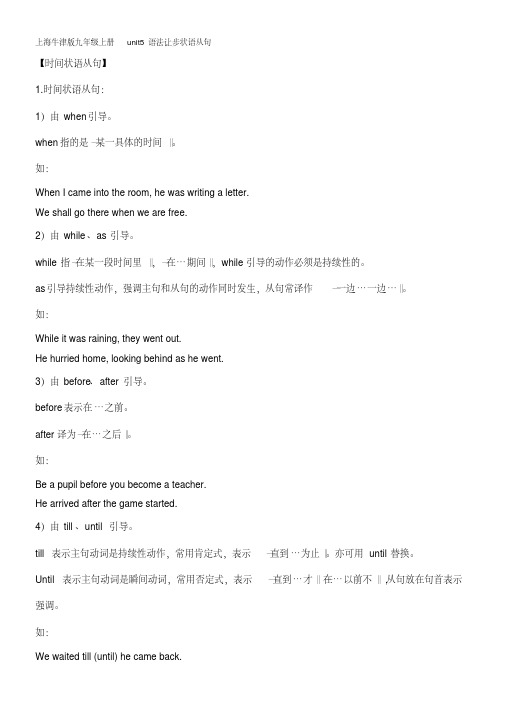
上海牛津版九年级上册unit5语法让步状语从句【时间状语从句】1.时间状语从句:1)由when引导。
when指的是―某一具体的时间‖。
如:When I came into the room, he was writing a letter.We shall go there when we are free.2)由while、as 引导。
while指―在某一段时间里‖,―在…期间‖,while引导的动作必须是持续性的。
as引导持续性动作,强调主句和从句的动作同时发生,从句常译作―一边…一边…‖。
如:While it was raining, they went out.He hurried home, looking behind as he went.3)由before、after 引导。
before表示在…之前。
after译为―在…之后‖。
如:Be a pupil before you become a teacher.He arrived after the game started.4)由till、until 引导。
till 表示主句动词是持续性动作,常用肯定式,表示―直到…为止‖。
亦可用until替换。
Until 表示主句动词是瞬间动词,常用否定式,表示―直到…才‖―在…以前不‖, 从句放在句首表示强调。
如:We waited till (until) he came back.She didn’t stop working until eleven o’clock.5)由since,as soon as 引导。
状语从句在主句之前时一般用逗号与主句分开,如从句在主句之后则不必用标点符号。
如:Great changes have taken place in China since 1978.练习:1. –What was your brother doing at this time yesterday?–He was reading a magazine ________ I was writing an e-mail at home.A.as soon as B.after C.until D.while2. Making friends is not easy. Sometimes it can take years you become true friends with someone. A.before B.after C.because D.Unless3. —Hurry up! The bus is coming.een.—Wait a minute. Don’t cross the street _______ the traffic lights are grA.until B.after C.while D.since4. He was so tired that he fell asleep ___he went to bed.A.as if B.even though C.ever since D.as soon as5. I didn’t know he came back __________ I met him in the street .A.since B.when C.until D.after6. He has been collecting coins _______ he was seven years old.A.because B.while C.when D.since7. Uncle Wang didn’t stop to have lunch __he finished mending the TV set.A.if B.when C.until D.as8. ______ Kathy was watching TV, her mother asked her to go shopping.A.Before B.Until C.While D.After考点:连词辨析点评:连词在句子中主要起联系上下文的作用,他们之间的区别就是表示逻辑关系的不同,所以在解题时先要理解上下文含义,然后根据上下文逻辑关系选择合适的连词。
高中英语外研版必修二Unit5重点单词词组语法要点

unit 5一、要点语法知识:1.only if 只有,指引条件状语从句。
if only 希望,假如 ---就好了,后用虚构语气,谓语动词用过去时表示此刻或未来来难以实现的梦想,用 had+过去分词,表示过去没有实现的梦想。
eg. If only I were rich. If only I had gone by taxi.2.make +宾语 +宾语补足语: make +宾语 +不带 to 的不定式,变成被动语态时不定式要带 to ;make+宾语 +名词 / 形容词; make+宾语 +过去分词; make+it+adj./n.+带 to 的不定式中 it 是形式宾语,带 to 的不定式为真实的宾语。
eg. He spoke loudly in order to make himself heard. Our parents always make me feel good about myself.3.There is no doubt that---毫无疑问 ---that 指引同位语从句,解说说明 doubt 的详细内容。
同位语从句:同位语从句一般由 that 指引,常放在doubt ,fact ,news ,idea ,truth ,hope ,problem ,information ,thought 等抽象名词后,解说说明该名词的详细内容。
eg. The manager put forward a suggestion that we should have an assistant.4.动词 -ing 形式作定语:表示被修饰词的属性、作用或用途,作“供 ---用”a reading room; 被修饰词与此刻分词之间是主动关系done 表示被动动作已达成 The stadium built last year is the biggest one in our city. being done 表示被动动作正在发生 The stadium being built now will be the biggest one in our city.to be done 表示被动动作将要发生 The stadium to be built next year will be the biggest one in our city.5.can’twait to do sth. 急不可待地要做某事 can’t help doing sth.不由得做某事can’t help to do sth.不可以帮助做某事 can’thelp but do sth.不得不做某事can’t choose but do sth.不得不做某事 can’tbut do sth. 不得不做某事 have no alternative but to do sth.别无选择只能做某事6.had done sth.when---刚做完某事,这时 ---be doing sth. when---正在做某事,这时---be about to do sth. when---正要做某事,这时 ---be on the point of doing sth.when---正要做某事,这时 ---be worth doing sth.值得做某事二、要点词组用法:1.agree with 赞同,同意,与 ---符合 agree on 就---获得一致建议 agree to do sth.赞同做某事2.be determined to do sth.信心做某事 determined 坚定的,果断的3.spend time in doing sth.花销时间做某事;人 +spend+金钱 / 时间 +on sth.;It +takes+人 +时间 +to do sth.;人+pay+金钱 +for+物;事 / 物 +cost+人+金钱4.in particular=particularly 特别,特别 be particular about 对---挑剔 be particular to 是 ---独有的5. take every opportunity to do sth 抓住全部时机做某事in advance 提早,早先6.make an impact on 对产生影响 have an impact on/upon 对---有影响 impacton/upon 对 ---有影响 have an effect/influence on/upon 对 ---有影响7.make a comment about/on 对做出议论 without comment 不予议论 no comment 无可奉劝 comment on---议论 ---,对 ---提建议8.be used to( doing)sth.习惯于 (做)某事 used to do sth.,过去经常做某事 be used to do sth.被用来做某事19.become/be familiar with 熟习10.over time 跟着时间的推移 ,逐渐地 ,慢慢地 (多与达成时连用 )all the time 向来from time to time 有时,有时 in no time 立刻,立刻 at the same time 同时11.When it comes to 一谈到 ---就---而论 come up to 达到(标准)比得上 come on 赶忙,加油come about 发生,产生come across有时遇见,有时发现come to 合计,达到,清醒come over 来访,拜见come out 出现,第一版,开花come up with 提出,想出12.for the first time 第一次 the first/second ---time 第一、二次 every/the last/the next time 每次、上一次、下次 the moment/minute/second 一---就---immediately/instantly/directly一---就---at the moment当前13.make it 实时抵达,获得成功 manage to do sth.想法做成某事 share---with---与---分享 pick up 捡起,学会,收听,接收,接某人get lost 迷路14.cheer up 高盛行来,抖擞起来cheer on 为---加油 get mad 生气15.keep in touch with 保持联系 stay in touch with 保持联系 get in touch with 获得联系 lose touch with 失掉联系 be in touch with 有联系 be out of touch with 失掉联系16.fall apart 破碎,崩溃 fall behind 落伍 fall off 掉下 fall down 跌倒,失败17.at that 别的 ,并且 less than 少于 no less than许多于 ,多达 (重申多 )not less tha 许多于 ,起码 (重申最低限度 )18.regard.as..以为,把看作 come true(梦想、梦想等 )实现 ,成为现实三、要点单词学习:1.destination 目的地,终点2.aware 意识到的,知道的 be/become aware of/that.--- 知道,意识到 as far as ’Im aware 据我所知 raise the awareness of---提升 ---的意识 arouse one’s awareness of---唤起某人对 ---的意识3.quit 走开,离职;停止,戒掉quit doing sth. 停止做坏事或令人讨厌的事4.previous 从前的,先前的previous to 在---从前 senior to 比---级别高的 junior to比 ---级别低的 inferior to 比---差的 superior to 比---好的5.engage参加,参加 engage in参加(活动)engage with---与 ---成立亲密联系engage sb.’sinterest/attention 吸引某人的注意6.fantastic 极好的7.mass大批,很多 a mass of/masses of大批 ,很多8.typical 典型的,有代表性的anyway 不论怎样,即使这样9.extremely adv 极度 ;极其10.unique adj.唯一无二的 ;仅有的11.admire v.赏识12.quest (长久的 )追求探究 ,追求2单词测试unit 5destination---------------- indigenous------------------------ 追求,探究 -------------走开 ----------------------profession------------------ previous-------------------route-----------------------dramatic--------------------- budget----------------------transfer-----------------荒僻的,偏僻的--------------参加,参加--------------mass---------------------cash--------------------credit card-----------------3。
高一英语外研版(2019)必修第二册Unit5 On the road单元考点解析
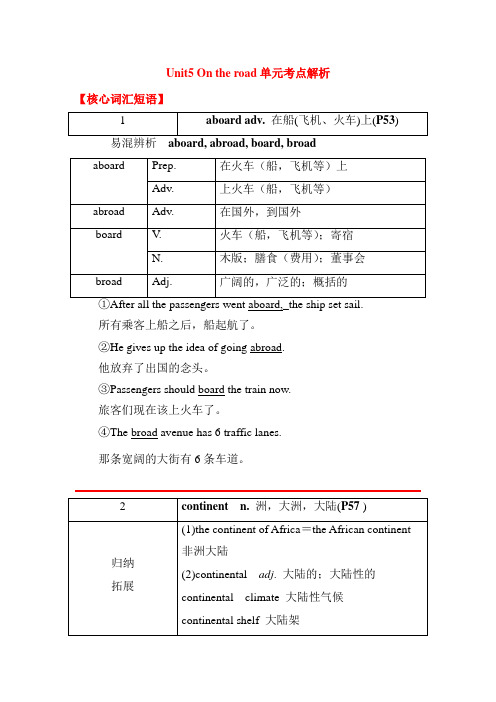
Unit5 On the road单元考点解析【核心词汇短语】After all the passengers went aboard,_the ship set sail.所有乘客上船之后,船起航了。
②He gives up the idea of going abroad.他放弃了出国的念头。
③Passengers should board the train now.旅客们现在该上火车了。
④The broad avenue has 6 traffic lanes.那条宽阔的大街有6条车道。
①We're going to spend a weekend on_the_continent_of_Europe.我们要去欧洲大陆度周末。
②We have continental_climate here.我们这里是大陆性气候。
We eventually arrived_at_our_destination.我们终于到达了目的地。
②Please tell me your best item of payments, port_of_destination and the way of packing.请告诉我你们最好的付款方式、目的港以及包装要求。
③This place is still undeveloped as a tourist_destination.作为一个旅游目的地,这个地方还未被开发。
名师点津destination用于具体意义时指“目的地,终点”,用于抽象意义时指人的“理想,目标”,该词常用作单数形式。
We engage_him_as technical adviser.我们聘请他担任技术顾问。
②He wants to engage_in foreign trade.=He wants to be_engaged_in foreign trade.他想要从事外贸工作。
③My daughter was_engaged_to a young teacher.我女儿和一位年轻老师订婚了。
Unit 5 第3课时 课本讲解及语法拓展-七年级英语下册同步精品课堂(牛津上海版)

What can we learn from others
Episode3
牛津上海版 英语 七年级 第二学期
Think and say
1-1
Listen and say
4-1
/v[ t/
1234
4-2
We’re going to vote for model students. Who do you think is a model student? What can we learn from him or her?
123
3-3
3-1
Look and say
Model students in Class 7A
123
3-2
Model students in Class 7A
123
3-3
Model students in Class 7A
123
Look, read and match
A 1. I can’t speak English,
A.usually B.always C.sometimesD.never
3.My father has a healthy living habit. He ________ stays up late and he is an early bird.
A.never B.usually C.always D.sometimes
A.few
B.a little C.little D.a few
6.—There are so many trees on ________ side of East Lake Green way.
—Wow, I’d like to walk around.
- 1、下载文档前请自行甄别文档内容的完整性,平台不提供额外的编辑、内容补充、找答案等附加服务。
- 2、"仅部分预览"的文档,不可在线预览部分如存在完整性等问题,可反馈申请退款(可完整预览的文档不适用该条件!)。
- 3、如文档侵犯您的权益,请联系客服反馈,我们会尽快为您处理(人工客服工作时间:9:00-18:30)。
注意:在时间状语从句里,通常不用将来 时态,用现在时态表示将来的动作或状态。 “主将从现”例如: I’ll ring you up as soon as I get to New York. I will tell him everything when he comes back. He won’t believe it until he sees it with his own eyes. 注意:when 用在时间状语从句和宾语从句 的区别
(一息若存,希望不灭)
★ as 的常见用法: 1. She sang as she worked. 一边……一边…… 2. You must try to do as I did. 像…..一样 3. As she was late for class, she had to say sorry. 由于
6.______ After he had finished his work, he left there. 7.It is two years ______ since he came here. 8. _______ Until she told me, I had no idea of what they had said. 9.Don’t get off the bus _____ until it stops. 10.He waited for her ________ until/till 6 o’clock.
1. ______ When he comes here tomorrow, I will call you. While/When he was walking in the 2. ____________ street, he met Tim. 3. She sang ____she cooked. as as soon as 4. There was an applause ___________ she appeared on the stage. before 5. It won’t be long ______he finishes his writing.
时间状语从句
中考题型
6.It ______ ten years since they ______ to France.(河北) A.as;covered B.was;have moved C.is;have moved D.is;moved
7.He ______ wait until the rain ______ .(南京市) A.won't;will stop B.won't;stop C.will;stops D.will;will stop
while / when 辨析
when/while+doing e.g.
When/while reading,he fell asleep. when+短暂性/延续性动词;while+延续性动词 e.g. 当老师进来时,我正在睡觉。 When the teacher came in,I was sleeping. =While /When I was sleeping, the teacher came in. when (就在这时) e.g. 我正在睡觉,就在这时有人敲门了。 I was sleeping, when someone knocked at the door.
1. ___ If you touch an English person, you should say “sorry”. 2. _____________ As long as we don’t lose heart, we’ll find a way to overcome the difficulty. 3. Don’t touch anything _______ your unless teacher tells you to.
状语从句的种类
1、时间状语从句 when, while, as soon as, since, until, before, after 2、条件状语从句 if;unless; as long as 3、原因状语从句 because;since ;as 4、目的状语从句 so that ; in order that 5、结果状语从句 so/such…that 6、让步状语从句 although, though 7、比较状语从句 than;as…as; not as/so…as
2.not…until用于否定句时,主句谓语动词是非 延续性动词,从句为肯定,意为“某动作直到某 时间才开始”。如:直到她回来我才开始看电视。
I did not watch TV until she came back.
3.till不可以置于句首,而until可以。如: Until you told me I had no idea of it.
1. 时间状语从句
引导时间状语从句的关联词常有:after,
before, when, while,as soon as, as, since, until 等。 e.g. 我吃完午饭后就去上学。 I went to school after I had my lunch. e.g. 他睡觉之前要先刷牙。 He brushed his teeth before he went to bed. Wait until he comes back. e.g. 等他回来吧。
练习 : 1. I’ll write to you _______ I get there. A. while B. before C. as soon as D. by 2. He has lived in the city _________ he came back from America. A. when B. before C. since D. after 3. We won’t leave here _______ our teacher comes back. A. until B. since C. after D. as soon as 4. I had to finish the picture ________ my mother came back. A. until B. before C. after D. while 5. John fell asleep ________ he was listening to the music. A. after B. before C. while D. as soon as
(1)在条件状语从句里,谓语动词通常用现 在时态表示将来的动作或状态。例如: I’ll help you with your English if am free tomorrow. He won’t be late unless he is ill. 注意:if用在条件状语从句和宾语从句的区别 I don’t know if he will come tomorrow. If he comes tomorrow, I will tell you.
用作状语的从句叫做状语从句。引导 状语从句的关联词是一些从属连词。
ห้องสมุดไป่ตู้
When you cross the road, you must be careful. 当你过马路时要小心。(when是从属连词) I was late because I missed the bus. 我迟到了,因为我错过了公共汽车。 ( because是从属连词) If she asks me, I’ll tell her. 她如果问我,我就告诉她。(if是从属连词) You look as if you need a rest. 你看起来好像是需要休息。(as if是从属连词)
e.g. 他来时,我在做饭。 When he came, I was cooking. e.g. 我一回来就给你打电话。 I’ll call you as soon as I come back. e.g. 他们回来前,我们已经完成工作了。 Before they came back, we had finished the work. e.g. 自从他离开后我们没见过面。 We haven’t seen each other since he left.
You’ll be late ______ you don’t get up early tomorrow morning. A. if B. when C. before D. until If he ______ on time, we will go without him A. doesn’t come B. don’t come C. didn’t come If you _______ him tomorrow, please ask him if he 如果 ______ to work on the farm with us. 是否 A. see ; goes B. will see; goes C. will see; will go D. see; will go 总结: 条件状语从句考的频率比较高,主要考查if 连词和if引导的从句与主句的时态(主将从现)
while 的其他含义:
While I was walking down the street, I came across an old friend. when ( while =_______) He likes pop music, while I am fond of but folk music. ( while =_______) While I really don’t like art, I find his although work impressive. (while=_________) While there is life there is hope. as long as (while=___________) 只要有生命在,就有希望。
